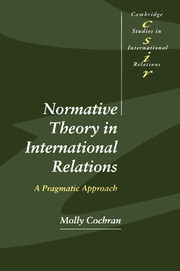Book contents
- Frontmatter
- Contents
- Acknowledgements
- Abbreviations
- Preface
- Introduction
- Part I Evaluating the impasse
- 1 Cosmopolitanism: Rawlsian approaches to international distributive justice
- 2 Communitarianism: Michael Walzer and international justice
- 3 Beyond the impasse? Hegelian method in the cosmopolitanism of Andrew Linklater and the Communitarianism of Mervyn Frost
- Part II Confronting the impasse
- Part III International ethics as pragmatic critique
- Conclusion
- References
- Index
- CAMBRIDGE STUDIES IN INTERNATIONAL RELATIONS
2 - Communitarianism: Michael Walzer and international justice
Published online by Cambridge University Press: 22 September 2009
- Frontmatter
- Contents
- Acknowledgements
- Abbreviations
- Preface
- Introduction
- Part I Evaluating the impasse
- 1 Cosmopolitanism: Rawlsian approaches to international distributive justice
- 2 Communitarianism: Michael Walzer and international justice
- 3 Beyond the impasse? Hegelian method in the cosmopolitanism of Andrew Linklater and the Communitarianism of Mervyn Frost
- Part II Confronting the impasse
- Part III International ethics as pragmatic critique
- Conclusion
- References
- Index
- CAMBRIDGE STUDIES IN INTERNATIONAL RELATIONS
Summary
Introduction
Communitarians in normative IR theory focus attention upon the value that social attachments have for individuals, and the implications of such attachments for the moral relevance of states in international practice. Communitarians in both political theory and normative IR theory hold that the individual's self-actualization is realized in the expression and pursuit of shared goods within a community. Because communitarians find that it is within the community that ethical relationships between individuals are made possible, they take communities to be the ultimate source of value in moral thinking. Therefore, considerations of justice must begin with community. While communitarians in both fields are rarely explicit about what kind of ties and associations are key to the construction of ‘community’, it can be said that normative IR theorists are fixed upon considerations of what kind of associations represent ‘community’ and, thus, should be accorded value in international practice. Generally, the form of community assumed or identified is the sovereign state or the nation. Thus, in international practice, considerations of justice for communitarians begin with these two forms of community.
This chapter will examine and critically evaluate the state-based communitarian position as it is articulated by Michael Walzer. Walzer is a communitarian whose writing crosses the boundary between the debates of liberals and communitarians in political theory and cosmopolitans and communitarians in normative IR theory.
- Type
- Chapter
- Information
- Normative Theory in International RelationsA Pragmatic Approach, pp. 52 - 77Publisher: Cambridge University PressPrint publication year: 1999

